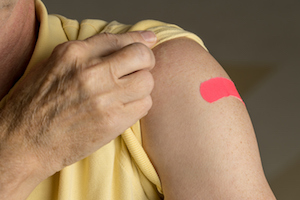Pneumonia symptoms can be severe and, according to the Centers for Disease Control and Prevention, about one million people need hospital care for this disease in the United States every year, with about 50,000 of them — mostly adults — dying from the disease.
Prevention is key, with the pneumonia vaccine being at the heart of preventive measures—but there has been plenty of back-and-forth debate over what versions of the vaccine Medicare will cover. The PPSV23 has been covered by Medicare and, in 2014, the Advisory Committee on Immunization Practices (ACIP), which is part of the Centers for Disease Control and Prevention, voted to recommend that a more advanced pneumonia vaccine—known as the PCV-13—also be covered.
This proposal was ultimately accepted, with Medicare currently covering both the PCV-13 vaccine and PPSV23. But in 2019, the ACIP met to reconsider that recommendation, with advocates for older adults being concerned about the negative impact, both financially and, potentially, health-wise — if the governmental agency voted against covering the PCV-13 through Medicare. If that happened, then older adults would need to pay as much as $200 per dose or decide not to get the vaccine — and this decision could also have a negative effect on private insurance companies covering the more advanced pneumonia vaccine.
Compromise Recommendation
On June 26, 2019, the ACIP committee recommended that the CDC should somewhat change its recommendation. For the past few years, the CDC has recommended that all adults over the age of 65 receive PCV-13. The governmental advisory group now says that each person over the age of 65 should instead meet with his or her physician to decide whether the PCV-13 vaccination is the one that makes sense.
That may not sound too bad, but some experts are concerned that the Centers for Medicare and Medicaid Services (CMS) may decide to stop covering the costs of the PCV-13 vaccine or limit that coverage. Without an ACIP recommendation for the vaccine, insurers won’t be required to cover the costs.
If that happens, some advocates fear that fewer people over the age of 65 will get pneumonia vaccines, especially in the more vulnerable minority populations. Doctors may be less likely to tell their patients they should get the vaccine and, as a result, pneumonia cases could very well become more common.
During this time of discussion and debate, it may not be 100 percent clear about what will and won’t be covered by insurance in the near future, so we’ll keep watching to see what develops. In the meantime, if you have any concerns about your own situation, be sure to talk to your doctor.
Other preventative measures you can take to avoid becoming ill with pneumonia include to regularly wash your hands and clean frequently touched surfaces. If you smoke, quit, and limit your contact with second-hand cigarette smoke. It can be helpful to carefully manage any other medical conditions you have, such as heart disease, diabetes or asthma. When people cough or sneeze into a tissue or sleeve, this can help to limit the potential spread of disease.










